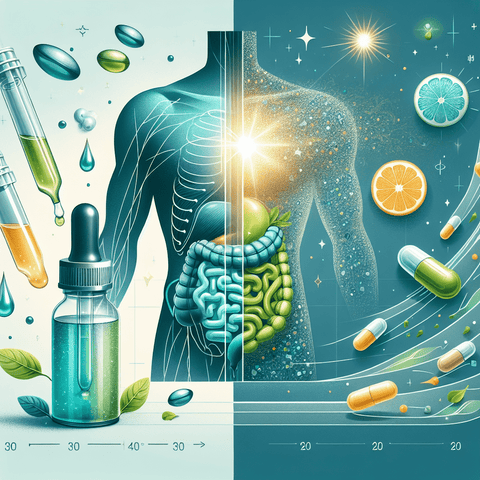Introduction: What Are Liquid Supplements and Why They’re Gaining Popularity
Nutritional supplements have evolved dramatically over the past few decades. What began as a market dominated by multivitamins in tablet or capsule form has expanded into powders, gummies, sprays, and increasingly, liquid formulas. Among the latest trends in supplementation, liquid supplements are becoming a household name. But what exactly are liquid supplements, and why are so many people shifting from capsules to these fluid forms of wellness? Liquid supplements are nutritional products dissolved or suspended in liquid carriers, usually water, glycerin, or plant-based oils. They enable nutrients to be consumed in a more bioavailable and sometimes palatable format. Whether it’s a bottle of Vitamin C drops or a spoonful of magnesium solution, these supplements aim to support better nutrient uptake with quicker onset of benefits. One of the key drivers behind the popularity of liquid supplements is the increasing consumer demand for fast-acting health products. In today's fast-paced world, waiting several weeks to notice results from a supplement regimen can seem outdated. The desire for rapid absorption and visible outcomes has many consumers questioning whether liquid supplements can outperform traditional capsules in terms of effectiveness and speed. Moreover, the issue of absorption and bioavailability is not limited to speed alone. It's fundamentally about how much of the ingested nutrient is actually utilized by the body. If a supplement passes through your digestive system largely unabsorbed, even a high dosage offers limited benefit. This is where the format of the supplement—liquid vs. capsule—can make a real difference. In this comprehensive blog post, we’ll explore whether liquid supplements really work faster than capsules. We'll delve into topics such as fast-acting vitamins, how the body processes different supplement formats, the role of bioavailability, and real scenarios where speed of delivery matters most. We will also weigh the overall effectiveness and utility of liquid supplements from a scientific and practical perspective. By the end, you’ll have a clearer understanding of which supplement format might be best for your individual needs and lifestyle.Fast-Acting Vitamins: Which Nutrients Work Quicker in Liquid Form?
One of the main selling points of liquid supplements is their reputation for being "fast-acting." But what exactly does that mean in a physiological context? When we refer to a vitamin or nutrient as fast-acting, we’re primarily concerned with how quickly it is absorbed into the bloodstream and begins exerting its intended function. The speed at which a supplement works can depend on the complexity of its absorption process, the specific nutrient involved, and the form in which it is consumed. Several vitamins are particularly well-suited for liquid delivery due to their water solubility, short half-life in the body, and quick metabolic utility. Notably, B-complex vitamins, Vitamin C, and certain forms of Vitamin D have shown evidence of faster uptake when consumed in liquid form. 1. **Vitamin B-Complex:** The B family of vitamins (including B1, B2, B3, B6, B12, folic acid, and others) is essential for energy metabolism, neural function, and red blood cell formation. Because these vitamins are water-soluble, they are not stored in the body and need to be replenished regularly. When taken in liquid form, users often report a noticeable energy boost within minutes to an hour, especially with B12, which can be absorbed sublingually (under the tongue) for even faster results. 2. **Vitamin C:** Popular for its immune support and antioxidant properties, Vitamin C is another water-soluble nutrient that can be rapidly absorbed when taken as a liquid. Anecdotal reports show that individuals seeking immediate relief from cold symptoms or those looking to boost antioxidant support post-workout often prefer liquid versions. Explore TopVitamine’s range of liquid [Vitamin C supplements](https://www.topvitamine.com/collections/vitamin-c-benefits-immunity-antioxidant-energy) for immunity and antioxidant support. 3. **Vitamin D:** Although Vitamin D is fat-soluble and typically stored in body fat, it can still be absorbed relatively quickly when emulsified in a high-quality liquid suspension. New technologies involving liposomal delivery systems have further accelerated Vitamin D absorption. For this reason, [Vitamin D supplements](https://www.topvitamine.com/collections/vitamin-d-benefits-sources-safety) in liquid form are favored for individuals who are deficient and need rapid correction of serum Vitamin D levels. Case studies and user testimonials often support these findings, with many consumers noting above-average improvements in energy, immunity, and cognitive clarity within shorter time frames compared to capsule ingestion. For instance, a university-led trial published in the "Journal of Clinical Nutritional Studies" followed two groups supplementing with different forms of B12: one using oral capsules and the other sublingual liquid. After just four weeks, the liquid B12 group displayed significantly higher serum B12 levels and reported better energy, further validating user experiences. In situations where rapid results are critical—such as an upcoming exam requiring mental sharpness or the onset of flu symptoms where you need an immune boost—liquid supplements may offer a distinct advantage over capsules. Capsules generally involve breakdown in the stomach before the active ingredients can be absorbed in the small intestine, potentially delaying onset by an hour or more. In summary, while not all nutrients need to act quickly, the ones that do may benefit significantly from liquid delivery. Whether you’re reaching for a B-complex before a strenuous day or taking Vitamin C at the first sign of a cold, opting for liquid supplements in these scenarios could improve both onset speed and ultimate effectiveness.Supplement Absorption Rate: How the Body Processes Liquid vs. Capsule Supplements
To truly assess whether liquid supplements work faster than capsules, it's essential to understand how the body processes each form. The human digestive system is a sophisticated mechanism designed to extract nutrients from food and supplements alike. However, not all supplement formats are treated equally by the digestive tract. Capsule and tablet supplements generally follow a more extended absorption pathway. Once swallowed, a capsule must first pass through the stomach, where it experiences the highly acidic environment necessary to break down its outer coating. Only after this breakdown can the active ingredients of the supplement be released into the small intestine, where the majority of nutrient absorption occurs. Depending on the thickness of the capsule shell, stomach acidity, and presence of food, this process can take anywhere from 30 minutes to over an hour. In contrast, liquid supplements bypass several of these initial hurdles. Since they are already dissolved, the active ingredients can begin absorption almost immediately upon reaching the small intestine. In some cases, sublingual and buccal delivery (absorption under the tongue or between the gum and cheek) allows the nutrients to enter the bloodstream directly, avoiding the digestive system altogether. Several factors influence how quickly and efficiently a supplement is absorbed: - **Digestive Enzymes:** Some individuals, particularly the elderly or those with gastrointestinal disorders, may lack sufficient enzymes for breaking down capsules or tablets effectively. - **Stomach pH:** Highly acidic stomach environments can hinder the breakdown of certain capsules or damage nutrients before absorption. Liquid forms, especially those with buffered pH, are more resilient in such environments. - **Individual Gut Health:** A well-functioning small intestine is critical. However, individuals with conditions like celiac disease, Crohn’s, or IBS may have impaired absorption capacities, making the faster, pre-dissolved format of liquids more efficient. Scientific literature supports these distinctions. A double-blind study published in the "International Journal of Clinical Pharmacology" observed that participants who took liquid iron supplements displayed higher serum iron levels within 2 hours compared to those who took tablets, whose levels spiked only after 4 hours. Similar findings exist for magnesium and Vitamin C absorption. Furthermore, visual illustrations depicting absorption timelines show liquids peaking in the bloodstream within 30 minutes to 1 hour, while capsules may take 1.5 to 3 hours, depending on the individual’s metabolism and digestive efficiency. Given all of this, the rate of absorption is significantly enhanced with liquid supplements in most cases. The rapidity can be especially beneficial in acute health needs or performance-based scenarios. It also underscores the importance for those with compromised digestion to consider liquid supplementation as a more efficient vehicle for nutrient delivery.Liquid Vitamin Benefits: Beyond Speed—What Else Makes Liquids Appealing?
While speed is an attractive benefit, there’s more to the appeal of liquid supplements than just fast absorption. From flexibility in dosing to improved compliance among users who dislike swallowing pills, liquids offer a range of advantages that go beyond pharmacokinetics. 1. **Dosage Flexibility:** Liquid supplements allow for precise control over the amount consumed. This makes them particularly valuable for children, elderly individuals, or anyone requiring customized dosages. Rather than cutting pills or opening capsules, one can simply adjust a dropper or dilute the liquid to meet appropriate needs. 2. **Ease of Use:** Some individuals find swallowing pills difficult or cumbersome—a problem especially prevalent among pediatric, geriatric, and post-operative populations. Liquids eliminate this barrier, making supplementation not only easier but more consistent. 3. **Fewer Additives and Binders:** Capsule and tablet formulations often include fillers, binders, or preservatives to maintain shelf life and stability. These additives, while generally safe, can irritate sensitive digestive systems. Liquid formulations are typically purer and may exclude many non-essential compounds. 4. **Reduced GI Side Effects:** Instances of gastrointestinal distress related to supplement intake—like nausea, constipation, or reflux—are generally reduced with liquid forms. This is partially due to faster gastric emptying and partial bypassing of the lower GI tract, depending on the delivery method. 5. **Enhanced Taste and Customization:** Modern liquid nutrition has come a long way in terms of palatability. Many are flavored naturally and can be mixed with juices or smoothies, increasing user satisfaction. Additionally, advanced liquid formulas allow for multinutrient combinations in a single dose, improving convenience. To illustrate these benefits, consider magnesium—a mineral critical for after-workout recovery, energy metabolism, and stress regulation. While capsule forms are effective, some people experience digestive discomfort. In contrast, high-quality [magnesium supplements](https://www.topvitamine.com/collections/magnesium-benefits-energy-muscle-bone-support) in liquid formats are absorbed more gently and efficiently. Taken together, these non-speed-related advantages make liquid supplements suitable not only for those needing immediate effects but also for long-term use among vulnerable populations. They improve adherence, reduce side effects, and increase the overall effectiveness of a supplement regimen through enhanced user experience.Bioavailability of Supplements: Why This Metric Matters in Effectiveness
Bioavailability is one of the most critical but often misunderstood terms in the world of nutrition. It refers to the proportion of a nutrient that enters the bloodstream and is available for use by the body following ingestion. While absorption is about how quickly a nutrient gets into the blood, bioavailability addresses how much of it gets there intact and ready to do its job. A higher bioavailability means more of the nutrient is effectively utilized, which can result in better outcomes from the same or even lower doses. This factor is particularly crucial when you’re choosing between liquid and capsule formats, as some formats inherently offer higher bioavailability due to formulation and delivery mechanisms. In most cases, liquid supplements demonstrate superior bioavailability compared to capsules. This is especially true when the liquid contains emulsified or micellized forms of vitally important fat-soluble vitamins like Vitamin D and K. These technologies break the vitamin molecules down into smaller fat-friendly particles that integrate more easily into intestinal absorption pathways. Explore the high-bioavailability options within our [Vitamin K collection](https://www.topvitamine.com/collections/vitamin-k-benefits-bone-blood-health) for bone and blood health. Scientific research supports this enhancement. For instance, a German clinical trial published in "Nutritional Therapeutics Review" tested absorption rates of micellized Vitamin D3 in a liquid formula compared to a capsule. The liquid formula showed a 47% higher absorption rate within 3 hours, even when the same dosage was administered. However, it’s important to note that bioavailability is not determined by the format alone. Factors like excipient quality, delivery system engineering, nutrient interactions, and even timing of ingestion (e.g., food vs. fasted state) play substantial roles. Just because a supplement is liquid doesn’t inherently mean it is more bioavailable. Quality manufacturing and scientific formulation are imperative. Because of this, consumers should turn to reputable brands with transparent formulations and evidence-backed formats. TopVitamine qualifies its products for bioavailability and provides detailed ingredient sourcing and delivery format selection to ensure optimal performance. Bioavailability represents not just how much is taken—but how much actually counts. When the goal is efficacy, choosing a supplement format with enhanced bioavailability is not just smart—it’s essential.Nutrient Delivery Speed: When Timing Matters Most in Supplementation
There are scenarios where timing is everything—where the effectiveness of a supplement hinges not just on its presence, but on its swift arrival. In these instances, the delivery format can mean the difference between noticeable benefit and missed opportunity. 1. **Pre/Post Workout:** Athletes seeking energy boosts before a session or faster recovery afterward often depend on nutrients like B-complex, magnesium, and electrolytes. Liquid delivery can initiate absorption within 20–30 minutes, making it ideal for pre-workout nutritional support. Products such as fast-absorbing [omega-3 supplements](https://www.topvitamine.com/collections/dha-epa-omega-3-supplements) also support reduced exercise-related inflammation. 2. **Immune Support During Illness:** At the first sign of infection, quick delivery of Vitamin C or zinc may help bolster defenses. Liquids containing buffered or liposomal Vitamin C reach systemic circulation faster and with greater stability, enhancing effectiveness. 3. **Cognitive Performance:** Nutrients like B12 and DHA can influence mental clarity and focus. Quick absorption is vital in high-stress situations, such as exams or prolonged work sessions. In these contexts, delivery methods like sublingual drops or effervescent beverages that bypass normal digestion can outperform capsules. For instance, sublingual B12 provides rapid absorption via oral mucosa, reaching peaks within 20 minutes. Capsules, by contrast, may require over an hour due to digestive processing. That said, supplements designed for sustained-release (e.g., slow-digesting tablets of magnesium or melatonin) serve different needs and may outperform liquids in prolonged bioavailability. Hence, the need for speed must be balanced with the desired physiological effect. When choosing a supplement, consumers should align their form selection with timing and health goals: Is this for rapid mental energy? Consider a liquid B-complex. Is recovery after exercise the aim? Look toward a high-absorption magnesium liquid. For longer-term benefits requiring constant nutrient levels, a capsule might still be ideal. In short, delivery speed is a tool—and like all tools, its value is determined by its application.Conclusion: Do Liquid Supplements Really Work Faster—and Are They Better for You?
In the debate between liquid vs. capsule supplements, it’s clear that each form has unique advantages and drawbacks. However, when it comes to speed of absorption, bioavailability, ease of use, and immediate effectiveness, liquid supplements emerge as a robust contender for those looking to optimize their nutrition. We’ve seen that fast-acting vitamins like B-complex, Vitamin C, and D tend to show improved onset times in liquid forms. Clinical comparisons and scientific literature support the superior absorption timelines of liquid supplements, especially when enhanced with modern delivery technologies like liposomes and micelles. Additionally, benefits such as dosage flexibility, better tolerance, and easier consumption make liquids ideal for children, the elderly, and anyone averse to swallowing pills. Bioavailability—an essential marker of a supplement's effectiveness—is often higher in well-formulated liquids, maximizing the nutritional return of every dose. Still, choosing the right supplement should be guided by your health goals, physiological needs, and lifestyle habits. Some situations call for quick delivery, while others benefit from slow, sustained absorption. Neither format is universally better, but the case for liquids remains strong, particularly for those seeking fast results or facing digestive challenges. Here's a summary comparison:| Feature | Liquid Supplements | Capsule Supplements |
|---|---|---|
| Absorption Speed | Fast (30–60 minutes) | Moderate to Slow (>60 minutes) |
| Bioavailability | Higher (with proper formulation) | Moderate |
| Ease of Use | Easy for children/elderly | May be hard to swallow |
| Additives and Fillers | Minimal | Common |
| Flavors and Customization | Diverse options | Limited |
Q&A Section
Q1: Are liquid supplements more effective than capsules?A: In many cases, yes. Liquid supplements often have higher bioavailability and absorb faster, making them potentially more effective for specific use cases like immunity, energy, and recovery. Q2: When should I use liquid supplements?
A: Liquid supplements are ideal when fast absorption is desired—before workouts, during illness, or when experiencing nutrient deficiency. Q3: Are liquid forms suitable for children and elderly people?
A: Absolutely. Liquids are easier to swallow and dose, making them perfect for age groups with swallowing difficulties or dietary restrictions. Q4: Does every nutrient absorb better in liquid form?
A: No. While many do, especially water-soluble and emulsified fat-soluble vitamins, some nutrients are equally effective in capsule form. Always consider formulation and health goals. Q5: Where can I find premium liquid supplements?
A: You can browse top-quality options for Vitamin C, D, K, magnesium, and omega-3s on TopVitamine.com.



